Payroll Outsourcing Issues You Need to Know
Managing payroll and human resources can be tough for a busy small business owner. Every time you hire someone, there are forms to fill, checks to sign, taxes to pay, regulations to comply with, paid time off to track, and so much more. And if you make a mistake, you could wind up having to pay fines and fees.
To help you decide, we’ve compiled a comprehensive guide to payroll outsourcing and the best payroll solutions for small business owners. Calm down and take a deep breath, the key is below.
What is Payroll Outsourcing?
Payroll outsourcing is a common practice by most small businesses. It’s more cost-effective to use a third-party payroll program to pay independent contractors and employees than paying a full-time payroll professional or on-site human resources manager.
Choosing a payroll outsourcing company goes beyond making sure your employees get paid on schedule. When you hire new employees or independent contractors, these companies also notify the appropriate state government agencies so wages can automatically be garnished or withheld.
If you’re the small business owner, you only have to enter the number of employee hours or their fixed salary into the payroll software. On payday, the outsourcing company handles the direct deposit and tax withholding for you.
Benefits of Outsourcing Payroll
1. Time Savings / Productivity
Payroll processing inside your small business is a time-consuming process. Keeping track of benefit deductions, garnishments, new hires and terminations, paid time off as well as federal and state regulation changes can be frustrating tasks. Outsourcing payroll allows employers to concentrate on their core business and frees up the business owner, human resources or accounting personnel to work more on strategic tasks that could ultimately affect your bottom line. Regardless of the number of people employed by your small business, attending to payroll demands a great deal of time and attention to detail. Pay period follows pay period, requiring the business owner to input critical amounts of data and double-checking for any keying errors- time taken away from tasks a small business owner must attend to. Those repetitive tasks should not be hours taken away from a key management or owner’s daily productivity. Outsourcing payroll immediately frees up precious time. Employers only need to make contact with their outsourced payroll specialist by approving time once each pay period.
2. Reduce costs
The direct costs of processing payroll can be greatly reduced by working with a payroll provider. Small businesses, having an in-house payroll process is a money burner. If your business has fewer than 30 employees, there’s a very good chance that you can save money by outsourcing your payroll operations. Do the math. Figure out how many labor hours your employees are devoting to payroll-related activities, (Calculating payroll each time period, printing, signing, and distributing paychecks or pay stubs, computer software and program maintenance, training and support, keeping up with changes in tax rates/laws, preparing and remitting payroll taxes and returns to government agencies, w-2’s, garnishments, new hire reporting, generating reports for in-house and accountant use) calculate how much you’re spending and compare the amount to the plans offered by several payroll-services providers. You’ll probably be surprised by the result. When you consider the cost of an employee’s wages, then add in benefits, that can really add up quickly. If you are the owner of a small business and you are trying to do payroll yourself or inhouse, the cost of the time spent is even greater. If you outsource payroll, you don’t have to worry about your payroll processing company calling in sick, resigning, wanting to take a vacation or wanting to request a possible maternity leave that you have to pay for.
3. Avoid IRS penalties / Mistakes
The IRS states, 40 percent of small businesses pay an average penalty of $845 per year for late or incorrect filings and payments. Penalties for errors, omissions or late payroll tax filings can be very costly. Payroll mistakes are painful, angering employees and not reporting timely or accurately to the government post red flags to the IRS. Small business owners aren’t experts in the challenging world of government tax regulations. At the same time, they are legally responsible for any cases of misrepresentation or a failure to accurately report employment taxes to federal and state government agencies. Mistakes lead to audits and penalties—situations no small business wants or needs. Government rules and regulations are always changing and small business owners can’t be expected to stay on top of these changes. Professional payroll providers, on the other hand, must stay current with rules, regulations and changes in tax rates. A good payroll-services provider is far less likely to make a serious error than your in-house staff. Many outsourced payroll providers calculate payroll taxes, manage filings and payments and will assume the cost of penalties due to incorrect calculations or late payments so long as you provide the necessary information and funds on time. Keeping abreast of state, federal, local and industry-specific regulation changes can be at best a real challenge. A reputable outsourced payroll provider has a staff dedicated to keeping up to date on all of the changes that could affect your payroll, ensuring that you stay in compliance.
4. Team of Experts
Most small business owners and payroll-related staff don’t have time to research and study constantly changing regulations, withholding rates, and government forms. By outsourcing payroll, a small business can take advantage of the expertise that was previously available only to big companies. The most valuable payroll companies have a team of experts who handle many areas of human resources and payroll. Some of those would be a benefits department that would handle the administration of benefits and deductions in the payroll system, workers compensation experts, who would administer the changing of class codes should a job change for an employee, human resource experts who would help in employee issues and HR strategy. Make sure you engage a qualified team of experts who can administer all the aspects of your HR and payroll needs.
5. Enhanced Security
Payroll processing is a complex and potentially risky business operation. Even with long time trusted employees, there is always a risk of identity theft, embezzlement of funds, or tampering with company files for personal gain. There’s also an evident risk when using in-house payroll software: How safe and secure is payroll data on the company’s server or network? This very real question can consume a business owner’s energy and attention as well. Do you have the time and energy to closely supervise your business’s payroll for time and rate abuses and other unethical activities? Most payroll services have technologies that can spot and alert clients to various types of payroll fraud. Additionally, online payroll solutions offer a “safe haven” for your confidential payroll data. In addition to redundant backup and multiple server locations, a quality payroll provider invests in state-of-the-art systems for storing and protecting data, simply because it’s part of the service provided to clients.
6. Avoid Technology Advancement costs
A constant question for small business owners is whether they have the latest version of their payroll software and the most recent tax tables installed on their computer. Using the wrong tax tables can result in stiff penalties. Paying a maintenance fee and having to upgrade software is a fixed cost ongoing. Outsourcing payroll removes those costs and keeps payroll running smoothly.
7. Offer Direct Deposit
Providing direct deposit to employees is difficult if a company doesn’t use an outside payroll service. Increasingly, small businesses recognize that employees want direct deposit. Not having to make a trip to the bank is an important convenience for them. More importantly for business owners, direct deposit eliminates time-consuming and error-prone paper handling and the need to reconcile individual payroll checks every month. Using direct deposit reduces the risk of fraud by eliminating the use of paper checks that could be altered or counterfeited. Unlike a paper check that bears your account number for all to see, when you use direct deposit your account number remains confidential to your financial institution or payroll provider. Confidentiality is another benefit of outsourcing payroll.
8. Peace of Mind
With the help of a professional payroll service provider, the hassle and pain often associated with processing payroll is gone. You provide the basic information, and your payroll company takes care of the rest. And with guarantees of error-free payroll and tax filings and payments, you can eliminate the worry that many experience when it comes to paying employees and taxes correctly and on time. There’s a lot to be said for the peace of mind that outsourcing payroll services can bring to a business owner or manager. No headaches, no hassles: You’re left to focus on running a profitable business. A clear focused mind is one of the true benefits of outsourcing payroll.
Running payroll can be a difficult and time-consuming process. To simplify the complex task, more and more small businesses are employing online payroll services. To help you find the right online payroll service, we analyzed and examined dozens of options. Here is a roundup of the payroll services we think are best.
Top 10 Best Payroll Software Solutions for Small Businesses
1. QuickBooks Online Payroll (QBOP)
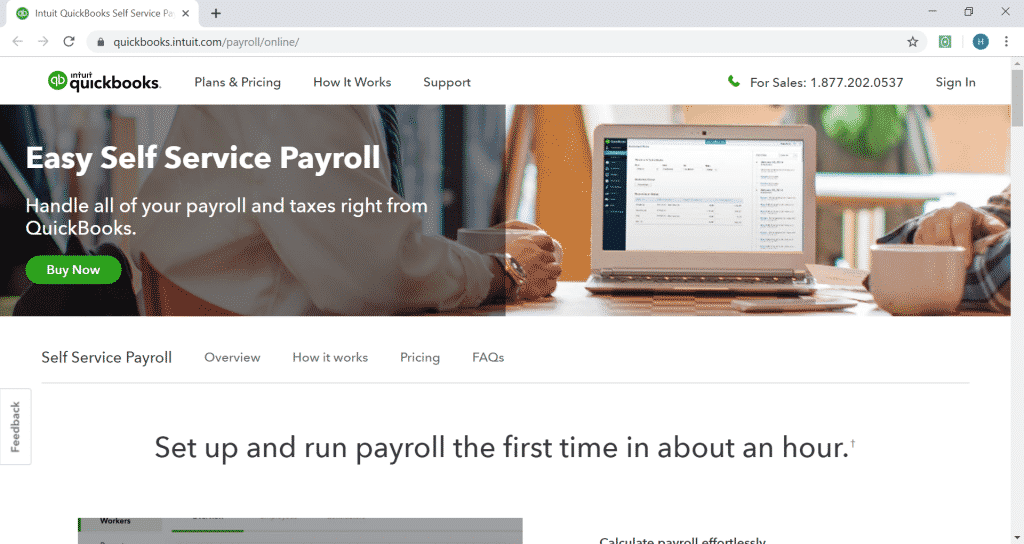
The prom queen of payroll software is QBOP (QuickBooks Online Payroll). QBOP is definitely the most popular when it comes to online payroll software solutions. It’s important to acknowledge that payroll systems are complex and rightfully so. That means that it takes time to learn how to use each one so wouldn’t you want to know how to use the most popular one?
Why choose QBOP?
Most popular software solution so very likely being used for general accounting, inventory management, invoices, etc.
- Many integrations available
- Employee self service portal
- Affordable for small businesses
- Versatility for various industries
- You can do in-house bookkeepin
2. Intuit Online Payroll (IOP)
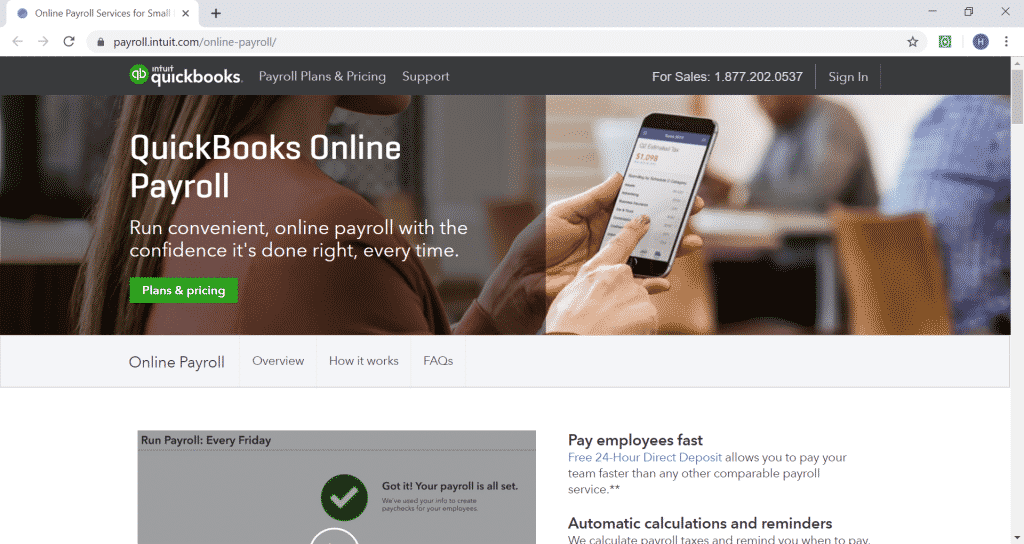
Many bookkeepers may not be aware of the difference between QBOP and IOP. IOP is best for bookkeepers or payroll services companies that run payroll for many clients. It acts as a payroll center for all of a bookkeeper’s accounts manageable from one place and easily integrates with Quickbooks and Intuit software. So, if you run accounting on QBOP then you can also run payroll on IOP and integrate between them.
In addition, another difference between QBOP and IOP is that IOP can be offered as a white labeled solution. That means that your clients will not be aware that IOP is being used as your payroll backend and you can market it as your own payroll solution. That should get some of those wheels turning.
Why choose IOP?
- If you run many payroll accounts, it’s more affordable than QBOP
- If you are already proficient in Quickbooks
- If you’re looking for a solution that easily integrates with Quickbooks solutions
- Client portal with various levels of Access
3. Gusto

Gusto is a payroll service that’s building an online presence that maybe you haven’t heard of yet. You can use one of their standalone plans as low as $45/month, or you can add their free app to your FreshBooks account. You can also integrate Gusto with your Quickbooks or Xero account too.
Nothing affects the length of time spent on payroll management like the application user experience. The word on the bookkeeping street is that Gusto is the most user friendly solution available on the market right now.
Why choose Gusto?
- Superb user experience
- Payroll reminders
- Employee self-service portal including employee onboarding
- Services available for both W-2 employees and 1099 contractors
- Unlimited monthly payroll runs
- Reasonable pricing
4. Paychex Flex
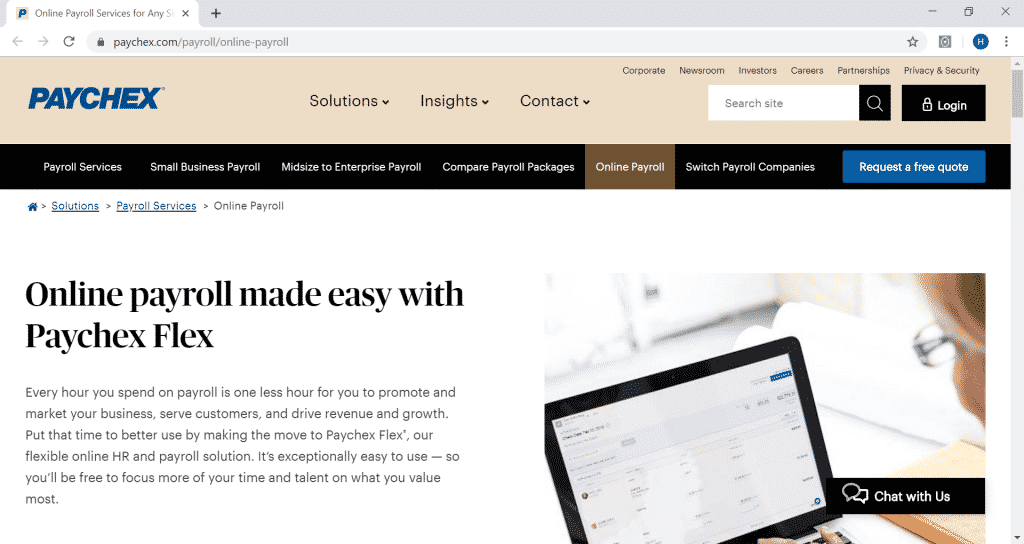
Paychex is one of the most popular payroll software for small business but also one of the more expensive solutions, mostly due to public demand. Rumor around the accounting department’s water cooler is that Paychex is robust but not simple, easy to use, or set up. That can be a huge factor for small business when they’re looking for the best payroll software. Paychecx requires a lot of personal information to get started and running reports comes with its share of red tape and added costs.
Why choose Paychex Flex?
- Great import and export capabilities
- Good cross-platform support for payroll and self-service functionality
- Useful payroll reminders
- Unlimited number of custom fields
5. RUN by ADP
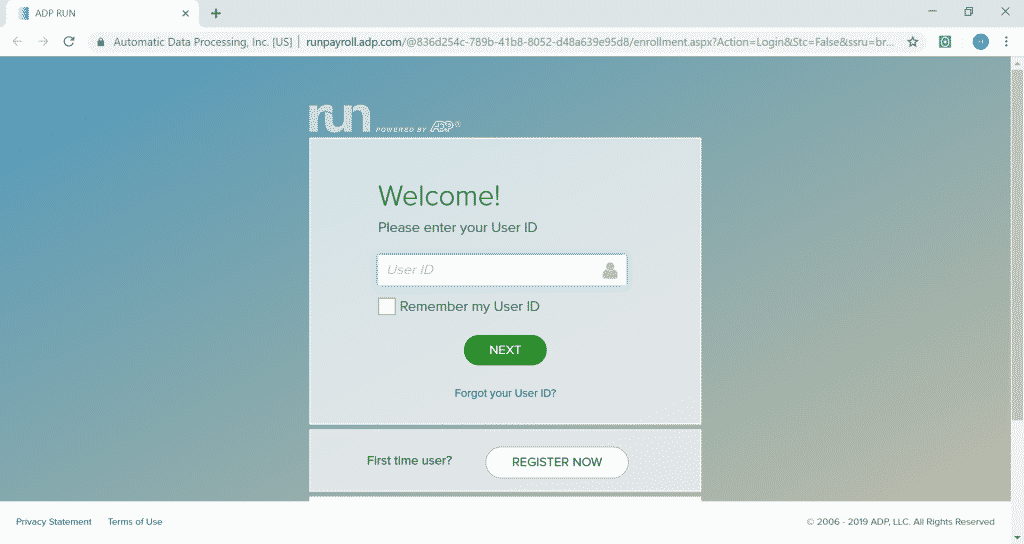
The solutions offered by ADP, and specifically their small-business oriented RUN, are very similar to those offered by above mentioned Paychex – expensive but popular. This solution is for you if you prefer to send employees physical paychecks rather than direct deposit as ADP can (for an additional fee) print, sign and mail paychecks on your behalf.
Why choose RUN by ADP?
- Popularity on the market – many accountants and bookkeepers are familiar with the interface
- Printing and mailing of paychecks
- Automatic wage garnishments and other withholdings
6. Sage Payroll
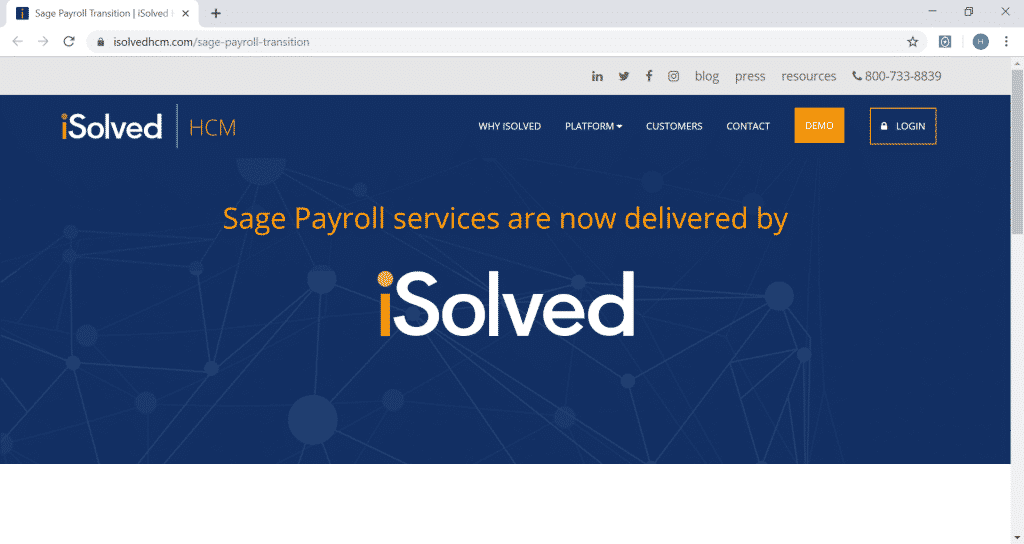
One of the cheapest payroll solutions out there for small businesses, Sage Payroll. Now it may lack the bells and whistles that other payroll software have to offer, but for many businesses it is more than enough in terms of functionality. One of its main strength is security – your payroll information in the cloud is fully encrypted, and user access permissions can be customized to ensure data security and integrity.
Why choose Sage Payroll?
- Superb reporting capabilities
- Affordable
- Custom user access permissions
- Top notch security
7. SurePayroll
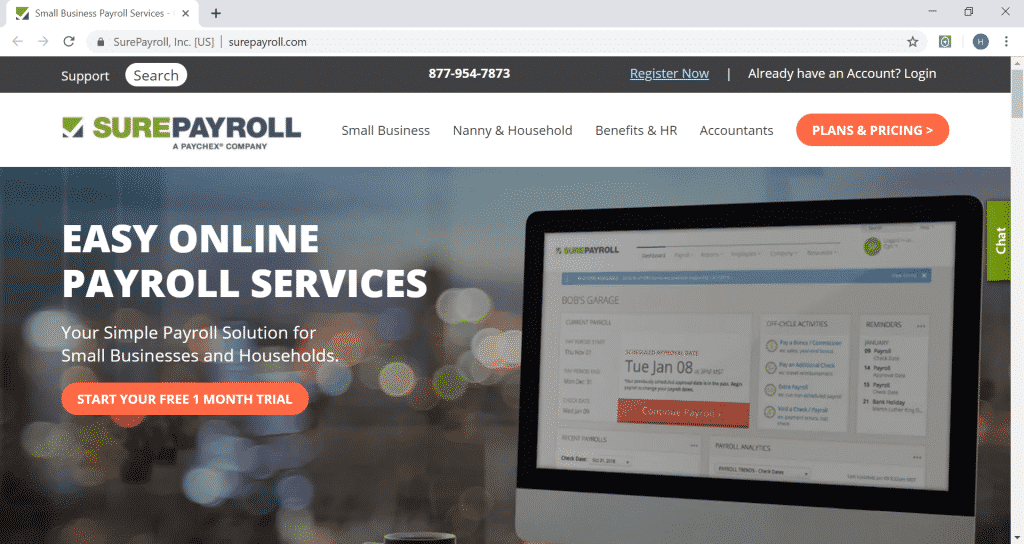
The jury is still out on SurePayroll’s ability to faithfully serve the needs of small businesses. While some claim it has a user-friendly and intuitive interface, others complain that the user experience is clunky and it takes a while before processes are properly streamlined.
In addition, some users are happy with the broad pre-defined set of fields and variables in the application database, and others despise the complex and long employee registration process.
Payroll software has to be flexible and SurePayroll demonstrates their ability to be flexible through their user experience, which is a sign of a good payroll solution.
Why choose SurePayroll?
- Customizable dashboard
- Highly detailed employee profiles
- Excellent service and customer support
8. Wagepoint

If you’re looking for the best-rated service and support, you should really check out what Wagepoint’s offering. In addition to clear and affordable pricing, Wagepoint offers a free trial period to let you try before you buy so that you can see just how helpful and friendly their software is.
Why choose Wagepoint?
- Superior service and customer support
- Free trial
- Affordable pricing
9. Xero
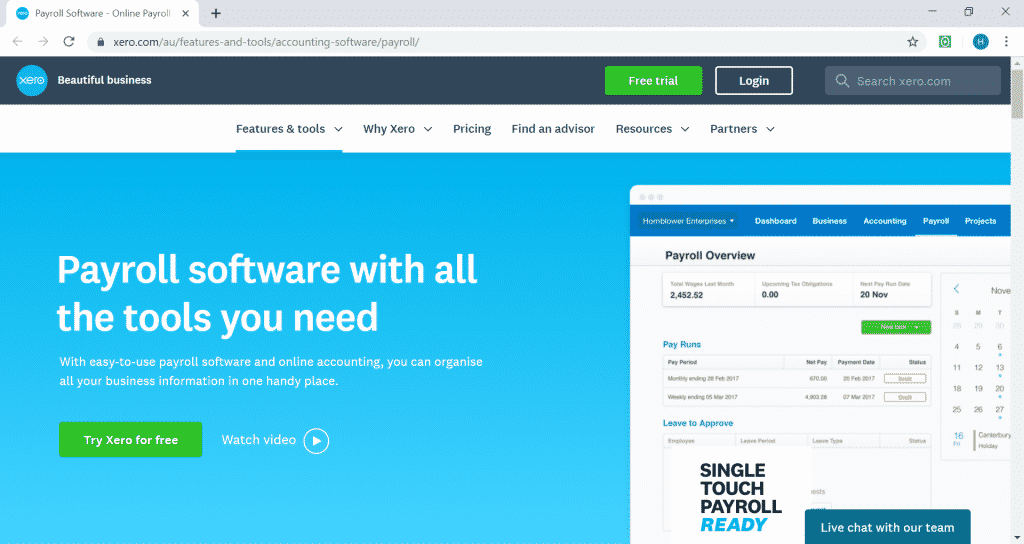
Here’s the thing, Xero is not just payroll software, it offers a web-based accounting system designed for small and growing businesses. In addition to payroll management, it has robust asset management capabilities, offers approval levels, inventory tracking and so much more. Therefore if you’re looking for an all-on-one small business accounting suite, this just might be it.
Why choose Xero?
- Thorough records and transaction forms
- Customizable reports
- 30 day trial option
10. PayCor Perform
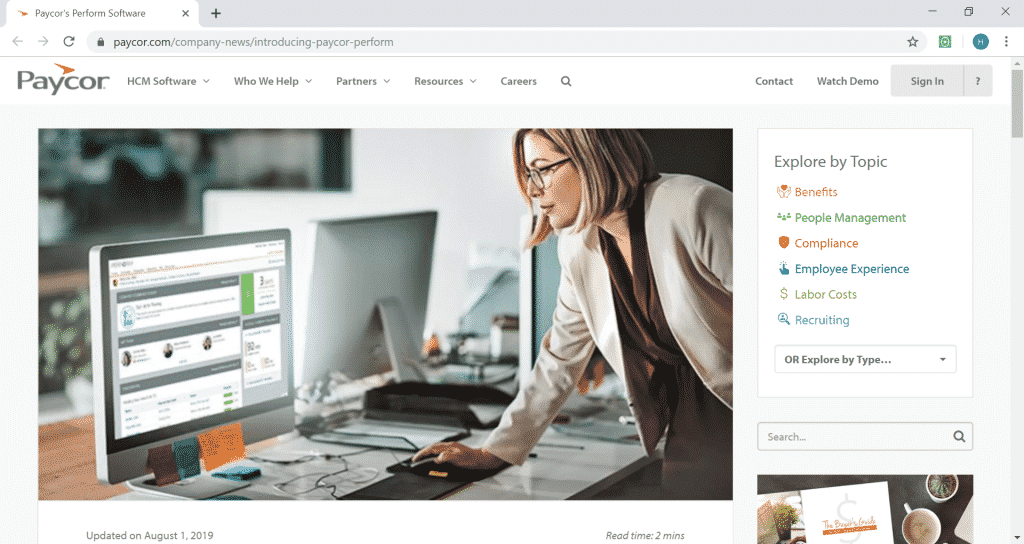
Like many other payroll software solutions PayCor is about much more than just payroll. It is a modular system that can be used for payroll alone, or use additional modules offered on the platform to manage all employee “lifetimes” within the company, from recruiting to departure.
Why choose PayCor?
- Important notifications and reminders
- Ease of use
- Integration with additional PayCor Perform Modules for an all-in-one solution
Conclusion
Payroll can be one of the most time-consuming administrative tasks you’re currently handling yourself. To make better use of your time, you can use a payroll outsourcing company to pay your employees and automatically handle the tax and benefit withholdings too.
Many small businesses choose to outsource payroll along with other back-office functions like accounting and taxes, so they can focus on their core business or manage revenue-generating tasks like sales, marketing, and customer service.









